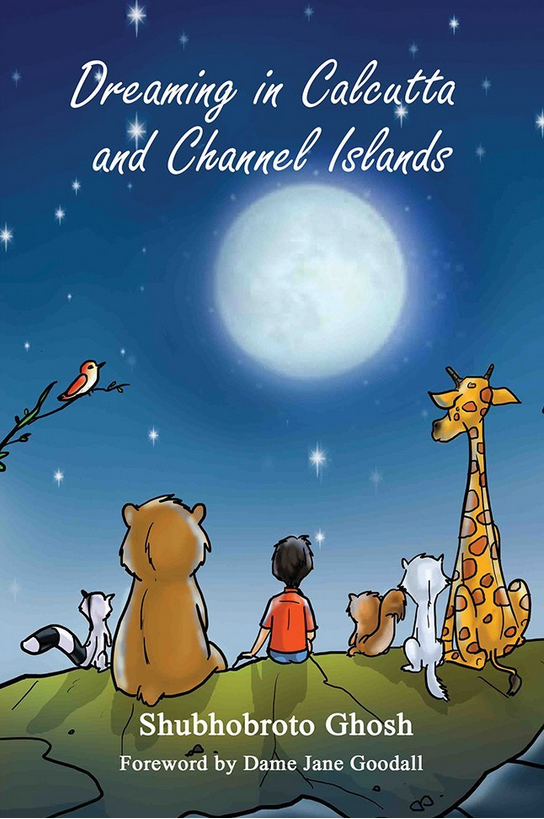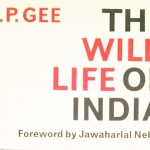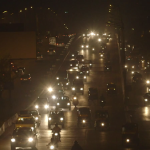Dreaming in Calcutta and Channel Islands
By Subhobroto Ghosh
Sometime back, Subhobroto had told me that he is writing a book about a boy influenced by Gerald Durrell and visiting Jersey Zoo etc. I am for freedom, for humans as well as for every species and hence detest zoos. So I quickly forgot about this book that Subhobroto was writing. A year or so passed and a few days ago, Subhobroto reminded me that his first book has been published and Jane Goodall has written the foreword. Also I got to know that a part of his own lifes journey has been weaved into this fictional tale, so I thought of checking it and read an electronic copy of the book.
In the first few pages of the book, before the foreword one finds two excellent quotes about dreams. Perhaps the author wanted us to remind not only the reason to dream but also the power of dreams. The first is by Langston Hughes exhorting one to hold onto the dreams.
Hold fast to dreams
For if dreams die
Life is a broken-winged bird
That cannot fly.
Hold fast to dreams
For when dreams go
Life is a barren field
Frozen with snow.
The other quote, is among one of my favourites and is by T. E. Lawrence
All men dream: but not equally. Those who dream by night
in the dusty recesses of their minds wake
up in the day to find it was vanity, but the
dreamers of the day are dangerous men, for they
may act their dreams with open eyes, to make it possible.
With these two powerful quotes on dreams, you are likely to take the story of the young boy far more seriously. If not so, then comes the foreword by Jane Goodall will, as she has written that this book “reminded me of my own childhood, and my seemingly impossible dream of going to live with animals in Africa”.With my taste buds suitably tickled, I started reading the book and immediately the story of Shamu reminded me one of my favourite authors Ruskin Bond and his stories of The adventures of Rusty. Those stories by Ruskin Bond had filled me with unalloyed joy and I was perhaps hoping too much from Shubhobrotos book, despite this being his first. However, I couldnt help imagining, as the story of a boy loving animals gives us a vicarious pleasure, after all havent we been in such a situation in our childhood days? So when we know that the story is that of a boys love for animals and dreams of a Durrell like zoo or perhaps much bigger like a massive Noahs Arc, the reader is initially ready for a Ruskin Bond like story.
However, several times I thought that I have perhaps inadvertently scrolled back few pages – as I was reading an e-version of the book – to realise that the same or similar events of Shamus childhood comes back again and again. Though the author has himself mentioned that Shamus notes of zoo visits become repetitive, it slows down the narrative at times. It may be pertinent to mention that, our harshest critics are our known friends and family who can at one instant get filled with joy or sunk into despair by the slightest pretext or provocation.
Initially I was under the impression that the author has tried to write a book to appeal to youngsters. However, given the wide variety of thoughts Shubhobroto has interspersed into his story telling, this book will leave the adult reader with thoughts to ponder for a long time.
For example, he talks about Karna, one of the Heros from the Epic Mahabharata and quotes Herman Melville.
Much later in life, he would find Karnas life story resonating in the words of Herman Melville, Miltons Satan is morally very superior to his God, for whoever perseveres despite adversity and torture, is morally superior to whoever in cold vengeance, takes the most horrible revenge upon his enemies.
The book is also peppered with nice quotes. It shows that the author is widely read and more importantly perhaps keeps notes. He quotes Mahatma Gandhi
The moral progress of a nation can be gauged by the way it treats its animals and then seamlessly moves to Gita to tell us that the Gita does preach compassion for animals and says that an enlightened person attaches equal importance to the life of an animal as he does to a human and the oneness of all Creation includes all forms of life.
Shubhobroto also gives us some food for thought when he reminds us As Edward Wilson says in his autobiography ‘NATURALIST’ we need brilliant enemies in our creative lives.
Through his protagonist, the author makes a powerful statement about animal rights and freedom when he writes might it not be that animals cherished freedom as much as he cherished his own? Today, human beings are no longer exhibited in zoos or bought and sold in the market as slaves but animals are. Maybe, a time will come in history when animals will be given the same rights as humans and people will look upon the present treatment of animals with as much revulsion as they look on slavery today. But does the world really change? Is slavery really extinct or does it survive in sugar coated forms churned out as benign and useful by public relations firms and executives?
At times the author also writes in a matter of fact tone to infuse some humour as well as to make a pointed comment as can be seen when he mentions that as per The American Heritage Dictionary the word zoo also means confusion or disorder.
The author also hasnt stopped at making commentary on the state of affairs with our education system where students try to get marks at any cost and learning becomes secondary. He speaks about the students who get disheartened and take the extreme step of committing suicide. He asks How many deaths will it take till we know that too many innocent kids have died?‘”
He has also covered interesting topics through innocuous conversations, for eg wastage of food. If people reading the book can inculcate the habit of not wasting food, then it would be a big help to conservation as roughly 30% of food is wasted worldwide. Without such wastage a lot of our fields can remain uncultivated, providing shelter to wildlife.
After reading this book, I was filled with a tinge of sadness because the protagonist in this book, Shamu, despite being young has much superior intellect than perhaps a majority of our decision makers in India today. May be it is time we shower kids with books such as this to enlarge their minds and pique their intellectual curiosity, so that this country can be a better place to live in.
Dreaming in Calcutta and Channel Islands By Subhobroto Ghosh is priced at 320/- and the Kindle edition of this book is also available at Rs. 249/- for download. I am sure this book will be liked by a majority of the readers.
You can buy the book from the below links –
Ebook : http://www.amazon.com/dp/B00SM3SREI
Infibeam:www.infibeam.com/Books/dreaming-calcutta-channel-islands-shubhobroto-ghosh/9789384923020.html
Crossword:http://www.crossword.in/books/dreaming-calcutta-channel-islands/p-books-9789384923020.html
Purushottam Bookstore:http://www.purushottam-bookstore.com/dreaming-in-calcutta-and-channel-islands?filter_name=Dreaming%20in%20Calcutta%20and%20Channel%20Islands
- GoPro Hero 12 Black - 6 September,2023
- Leopards: The Last Stand - 2 July,2023
- Drifting in the Waters of Sundarbans - 26 March,2023















Leave a Reply